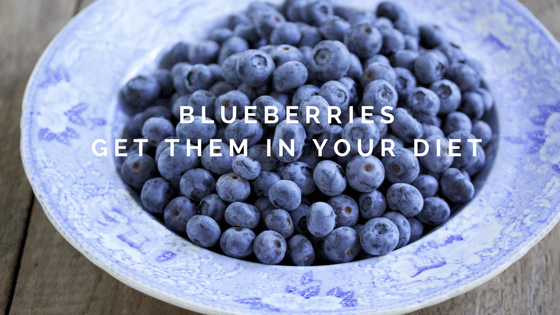Eat More Blueberries

We are coming to the end of the berry season but there are good reasons to keep on eating blueberries even in their frozen, canned, juiced or dried form. Blueberries are a super food that should feature in your daily diet. They are delicious so there is no twisting of arms needed to get people eating them.
Why are blueberries so good?
In animal studies the fruit has been found to prevent tumour formation, slow the growth of existing tumours, lower blood pressure, reduce inflammation in the body and slow down age related dementia.
They also improve mood and brain function. A 2010 study, with one group of men and women with an average age of 76 drank wild blueberry juice daily for three months whilst a control group drank a non-berry drink. At the end of the study the wild blueberry juice drinkers were found to score 30% higher on cognition and memory tests. They also has significantly better moods.
In a 2008 study 72 overweight women at high risk of cardiovascular disease were divided into two groups. One group consumed blueberry juice and berry eaters daily whilst the non-berry and juice group ate their usual diet and after two months the blueberry consumers were found to have significantly lower blood pressure, reduced risk of blood clotting and higher levels of protective HDL cholesterol than the non berry eaters.
The take home message?
Eating blueberries can help you stay physically and mentally healthier for longer and can stop your body – its cells and whatnot – from ageing prematurely. It’s amazing stuff and most of us do not eat enough of them.
The best way to eat your berries and get maximum health benefit is to cook them. Heat helps increase their nutritional content by rearranging the structure of the phytonutrients and makes them more bioavailable, i.e. better absorbed by our bodies. Hello blueberry pancakes, blueberry pie and blueberry crumble!
Blueberries are a great example of a food that acts as medicine and is a much tastier and healthier alternative to antibiotics. They truly are a nutritional superstar!
References
Suh, N., Paul, S., Hao, X., Simi, B., Xiao, H., Rimando, A.M. and Reddy, B.S., 2007. Pterostilbene, an active constituent of blueberries, suppresses aberrant crypt foci formation in the azoxymethane-induced colon carcinogenesis model in rats. Clinical Cancer Research, 13(1), pp.350-355.
Joseph, J.A., Shukitt-Hale, B., Denisova, N.A., Bielinski, D., Martin, A., McEwen, J.J. and Bickford, P.C., 1999. Reversals of age-related declines in neuronal signal transduction, cognitive, and motor behavioral deficits with blueberry, spinach, or strawberry dietary supplementation. Journal of Neuroscience, 19(18), pp.8114-8121.
Krikorian, R., Shidler, M.D., Nash, T.A., Kalt, W., Vinqvist-Tymchuk, M.R., Shukitt-Hale, B. and Joseph, J.A., 2010. Blueberry supplementation improves memory in older adults. Journal of agricultural and food chemistry, 58(7), pp.3996-4000.
Erlund, I., Koli, R., Alfthan, G., Marniemi, J., Puukka, P., Mustonen, P., Mattila, P. and Jula, A., 2008. Favorable effects of berry consumption on platelet function, blood pressure, and HDL cholesterol. The American journal of clinical nutrition, 87(2), pp.323-331.






